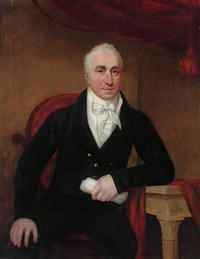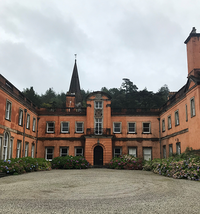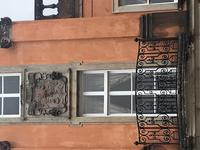Maristow House: land, power, and citizenship
The Jewish Country Houses Project owes a great deal to the Jeffrey Fund at Brasenose College, which provided us with a small amount of seed funding when we first started to get the project off the ground. We’ve always felt grateful for the initial support we received from Brasenose, but I certainly never expected to find the college featuring in my research agenda.

Manasseh Masseh Lopes
This time, last year, however, I visited Maristow House in Devon – a property that I knew had once belonged to Manasseh Masseh Lopes: a Sephardic Jew, born in Jamaica, who purchased the house in 1798 and converted to Christianity four years later, when he bought his seat in parliament in the rotten borough of New Romney. That very year, Manasseh had adopted his nephew Ralph Franco as his son and heir. Ralph too converted to Christianity – he was just about bar mitzvah age – and he too would become a Tory MP. A quick google established that Ralph was, moreover, a Brasenose alum - surely one of our very earliest “Jewish” students.
Unfortunately, the college archivist could tell me relatively little about him. Ralph had been born in London and educated at Winchester. As a Gentleman Commoner, he was entitled to take his meals with the Fellows at their table but in other respects was under a Tutor like any undergraduate. He had matriculated on 21 April 1807, aged 18, and graduated in 1811 with a 2nd Class in Classics. He removed his name from the College Books in 1813 (at which point fees were payable) replaced his name in 1832, removed it again in 1836, served as M.P. for Westbury 1814-1819 and 1831-1847, and assumed the surname and arms of Lopes by royal licence having succeeded his uncle as 2nd Baronet 1831. He later became M.P. for South Devon (1849-1854), Deputy Warden of the Stannaries, and died on 26 January 1854, still a member of the Phoenix Common Room.
Maristow was too peripheral to my project for me to wish to spend a summer in the Plymouth archives. Still, I was intrigued. I wondered if his house could tell me more.

Maristow is an elegant 18th century property, charmingly situated at the mouth of the river Tavy. It has been divided into flats (which are no doubt rather lovely), but the small private chapel still belongs to the Lopes family and the Lopes arms feature prominently on the exterior wall. As a Jewish country house, it falls slightly outside the chronological focus of our project which is firmly 19th and 20th century, because before this period Jews were prohibited from owning land in many parts of Europe, and even in Britain the right of Jews to own freehold land was contested until the early 1830s.

Not far from Maristow, at Sidmouth, a plaque in Connaught Gardens recalls a time when “The area was all in the ownership of Mr Lousada, who was a wealthy, retired Jew, and the first of his race to risk owning land in England.’ Although historically incorrect, this plaque symbolises both the promise and threat of landownership for Jews, who wanted and needed to buy real estate, but were uncertain of their legal right to do so.
Like Manasseh Lopes of Maristow, Emanuel Lousada of Peake House was a Sephardic Jew from Jamaica, who aspired to join the political establishment. He was, indeed, the first Jew in England to become a provincial High Sheriff, something that highlights the connection between land, power and citizenship in this era - and the place of Jewish country houses in the history of Jewish emancipation. From the point of view of our project, the Lousadas were also highly unusual as a property-owning Jewish family whose wealth derived largely from slavery. This was something they had in common with the Lopes of Maristow, although only the Lousadas received compensation as slave-holders in 1833. Unlike the Lopes, moreover, the Lousadas remained Jewish.
Even so, Maristow seems to speak both to the place of Sephardic Jews in the Atlantic economy, and to the obstacles they encountered when they sought to join the British establishment. By and large, however, the life and career of Ralph Lopes has more in common with that of Benjamin Disraeli: a man ten years his junior, and another Sephardic Jewish boy, who converted at bar mitzvah age and became a Tory politician. Interestingly, both Disraeli and Ralph Lopes voted several times against Jewish emancipation, although Disraeli’s position on this issue was more ambivalent. This may seem surprising to us, but it surely speaks to the stigma attached to their common Jewish origins well into the 19th century.
Having visited Hughenden, Disraeli’s country seat in Buckinghamshire, I was struck also by the prominence of the private chapel at Maristow. This, it transpired, was not part of the original 18th century house but rather a Lopes addition – and one that seemed rather unnecessary when the family could, quite easily, have prayed in the nearby church. I could not help wondering if it was a sign that later generations felt a need to advertise their Christianity rather publicly. For Disraeli, too, had taken an ostentatious interest in the little church that nestles in the hillside at Hillingdon, where he chose in fact to be buried. (The church also features a handsome bust of Queen Victoria as a personal tribute to her favourite prime minister).
The prominence accorded the Lopes arms was a further point of connection, for Disraeli’s arms – which draw upon Sephardic precedents – are one of the most interesting architectural features at Hughenden.
In this context, I was struck by the Lopes family motto: Quod Tibi, Id Alii. My Latin is not great; I consulted with my colleague, Professor Llewelyn Morgan, who translated it as “That which to you, that to another” – something that we might perhaps render as “Treat others as you would yourself”. Most of us would be familiar with this as a version of Jesus’ command to “Do unto others as you would be done by” – but I soon established that there are Jewish variants. Leviticus is the best known perhaps, but I rather liked the Talmudic version: “What is hateful to you, do not do to your neighbour; that is the entire Torah”.
As a motto for Manasseh, it seemed perfect: Christian and Jewish simultaneously, depending on who was looking. Pretty much par for the course for a “Jewish country house”.
Abigail Green, Brasenose College
(with thanks to Georgina Edwards and Llewelyn Morgan, and to Justina Sebag-Montefiore for driving me to Maristow).
Header photo: Maristow House overlooking the Tavy Estuary in Devon by Nilfanion (Wikimedia Commons). Other photographs of Maristow House by Abigail Green.



